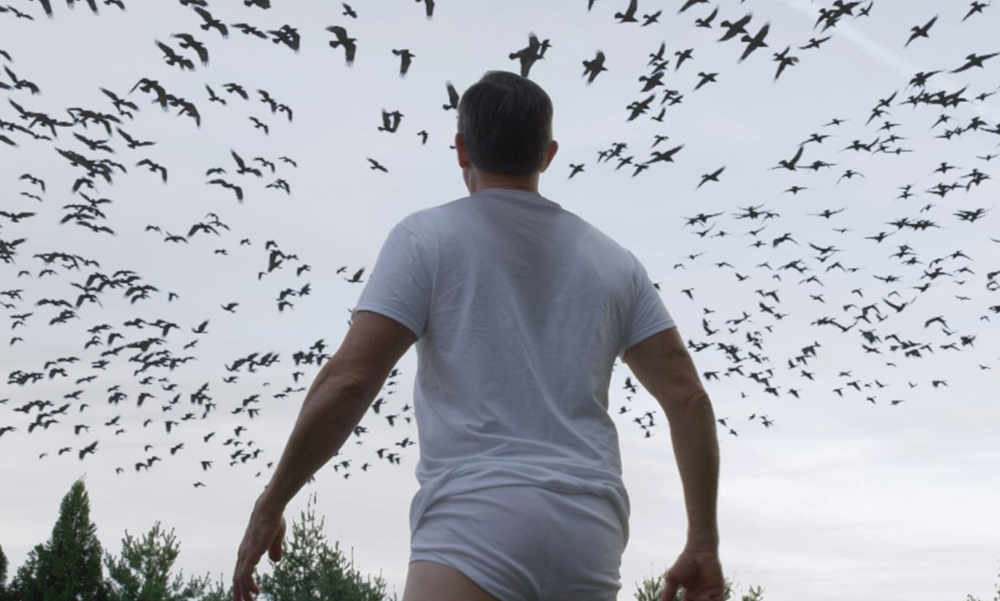“Thank the Lord for all the things we have and all the things we have coming,” Macy (Judith Hoag), the matriarch of the Simon family, says in better times in “Fishbowl,” with her three teenage daughters Belle (Belle Schickle), Jessa (Caroline Coleman) and Rachel (Emily Peachey) eager to tear into a pizza after saying grace while her husband Rick (Rick Kain) takes a sip of wine to take the edge off. Little could they know then that there would be a time when she was no longer sitting at the head of the dinner table, but it’s been exactly 118 days since she’s left when we first meet the rest of the clan in sibling directing duo Stephen and Alexa Kinigopoulos’ engaging debut, during which time the girls have become alienated from their father as well as other girls at their Christian High School to the point that Jessa has become a mute.
While the mother’s departure may seem like the end of the world for the entire family, Richard comes to believe it actually is, gloaming onto the late night ramblings of a televangelist who insists the rapture is coming on September 29th and for the mere price of $100, he’ll send a “Save Me Now” kit promising the five steps towards salvation. Barely able to muster lunch money for his daughters, he sets up his barcalounger facing the front door of his house, already foreclosed upon by the bank, waiting for the mail and though Rick may be slightly underwhelmed when the package arrives, it is the Kinigopouloses, working from a mischievous script by Stephen Kinigopoulos and Piero Iberti, who start delivering in spades.
At first, “Fishbowl” may wear its influences a bit too much on its sleeve, introducing the perfectly coiffed Belle, Jessup and Rachel in carefully composed slo-mo as if they stepped straight out of “The Virgin Suicides,” with Belle wistfully describing in voiceover her oppressive environs, both under her father’s thumb and in the depressed burgh of Bishop County where there simply isn’t much going on besides church on Sunday. But among many contradictions that “Fishbowl” seizes upon, the film shows more of a singular personality the more Richard tries to squeeze it out of his daughters, forbidding them from leaving the house except for school, and stripping the walls of their bedrooms of any reminders of the past, wanting them to concentrate instead on preparing for the second coming and forcing them to go door-to-door to convince others.
Besides being of an age where they’re starting to think for themselves, Rick’s assertions of authority are only so effective on the girls, who are all able to do a lot with a little as far as carving out individual identities for themselves, taking a risk any time they show it in front of their father. Schickle, in particular as the eldest of the three, proves to be a real discovery in her first film role, carrying herself with a movie star swagger, although Coleman and Peachey are equally intriguing, and given enough cutting remarks, or in the silent Jessa’s case, sharp glances, they bedevil their delusional dad in entertaining fashion. Yet as the family struggles to see what’s in front of them in the wake of Macy’s absence, the Kinigopouloses vividly capture the warped reality that takes hold as they come to believe the worst about their circumstances and by extension, each other. The Simon sisters may have thought things were bad when told of their town that it was like a fishbowl where “when you climb to the top, you just slide back down,” but in being able to peer over the top, the filmmakers behind “Fishbowl” allow that frustration to transform into something quite moving, showing that apocalypses need not be global events to be devastating. They can be more intense when they happen in living rooms.
“Fishbowl” will play at the Austin Film Festival on October 31st at 6:45 pm at the Galaxy Highland.




